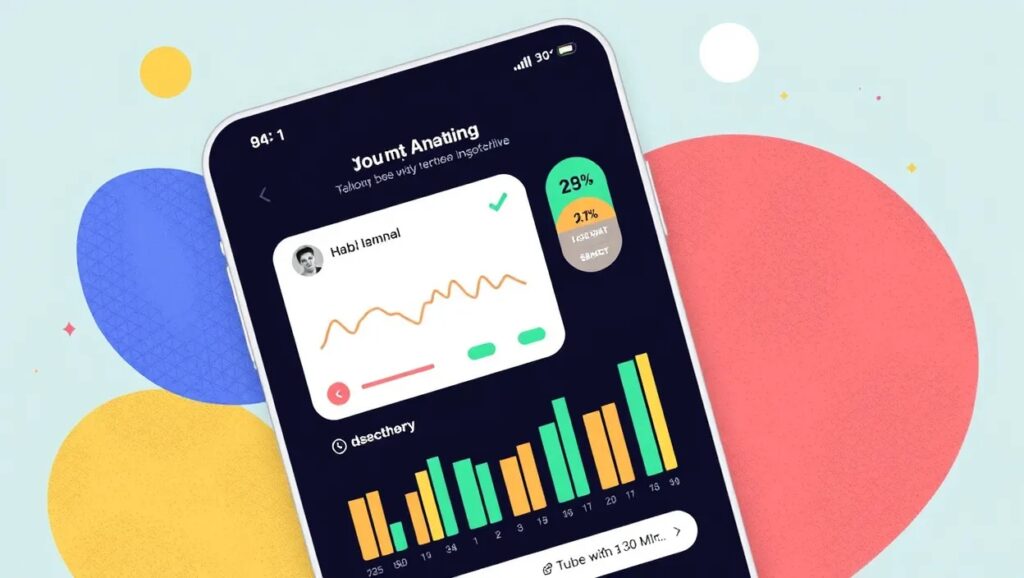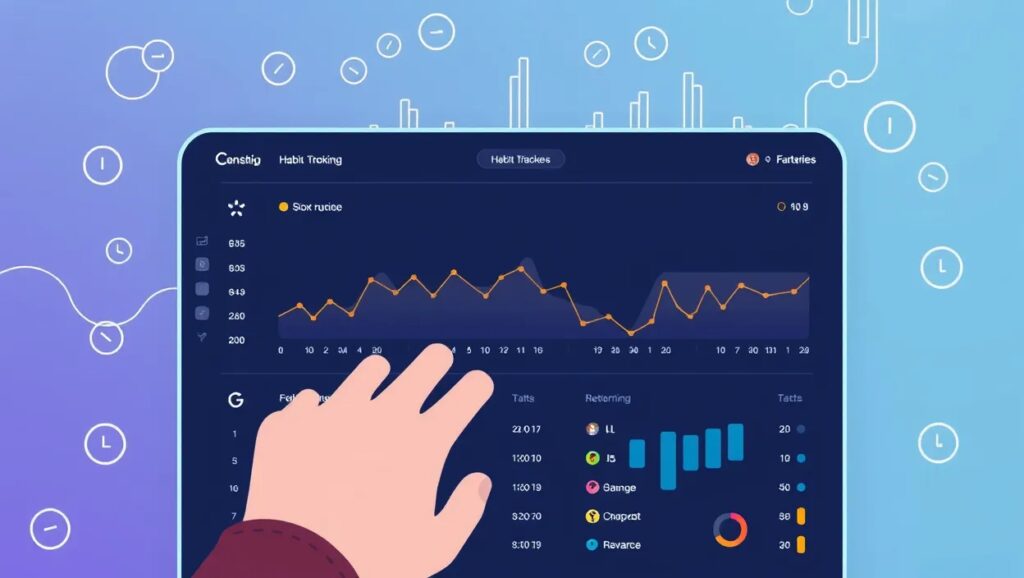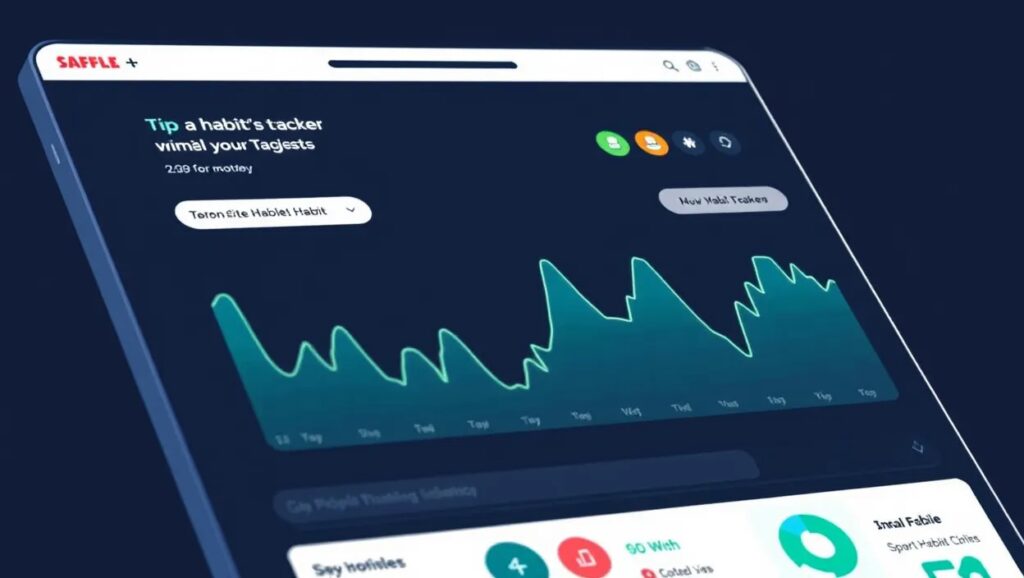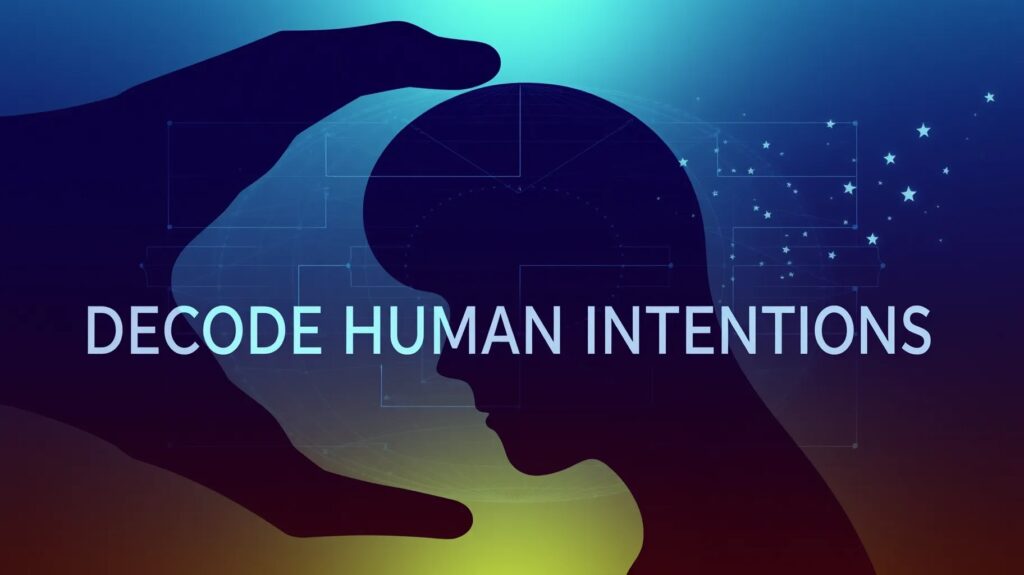
Building and maintaining habits can be challenging, but artificial intelligence (AI) offers tools to simplify and enhance the process.
By combining personalized insights, data-driven tracking, and behavioral psychology principles, AI-powered habit-tracking solutions can help you stay consistent and achieve your goals.
Why Use AI for Habit Tracking?
Personalized Recommendations
AI analyzes your behavior patterns to provide customized suggestions for building habits. Unlike generic habit trackers, AI-powered tools adapt based on your preferences and progress.
For example, if you’re struggling with a morning workout routine, an AI system might suggest shifting to an afternoon session, backed by your past performance data.
Accountability and Motivation
AI systems act like a coach, sending reminders, progress updates, and motivational nudges. By creating a virtual sense of accountability, they can keep you on track.
Imagine receiving a message like, “You’re 75% toward your goal this week! Just one more day to crush it.”
Data-Driven Insights
AI habit trackers analyze trends over time to help you understand what works. They can identify patterns—like when you’re most productive or prone to skipping tasks—and adjust recommendations accordingly.

Features of AI-Powered Habit Trackers
Smart Scheduling
AI can optimize your daily schedule by integrating habits seamlessly. For instance, it might suggest a meditation session when your calendar shows downtime or remind you to hydrate during a busy afternoon.
Behavioral Triggers and Reminders
AI tools use contextual triggers like location or time of day to prompt actions. For instance, a tracker might remind you to journal when you sit at your desk in the morning.
Goal Setting and Tracking
These tools let you set specific, measurable goals and track your progress with visual dashboards. AI adapts to your pace, suggesting adjustments when needed.
Examples of AI-Powered Habit Tracking Tools
Fabulous
An AI-enhanced app designed to build daily routines through science-backed prompts and gamification. It personalizes plans based on user feedback, making it easy to create sustainable habits.
Habitica
Transforms habit tracking into a gamified experience, where users earn rewards for completing tasks. AI analyzes habits to provide motivational boosts or adjust challenges.
Strides
This app uses AI-driven insights to create detailed progress reports and forecast outcomes. For example, it predicts when you’ll achieve a goal based on current habits.

Leveraging AI to Build and Sustain Habits
Use Predictive Analytics for Goal Adjustments
AI systems analyze your performance and adjust goals in real time. For instance, if you consistently complete 8,000 steps instead of 10,000, the tracker might reduce the target to make it more achievable while encouraging gradual improvement.
Combine AI with Wearable Devices
Wearables like smartwatches or fitness bands integrate with AI to monitor your activity and habits seamlessly. These tools provide real-time feedback, such as tracking steps, heart rate, or sleep quality, which directly ties to your habit goals.
Embrace AI-Powered Positive Reinforcement
AI can gamify progress, turning small wins into a motivating factor. For example, after completing a 7-day streak, the system might celebrate with a virtual badge or reward.
How to Get Started with AI for Habit Tracking
Define Your Goals
Decide on habits you want to build. Ensure they are specific, measurable, and tied to personal motivation.
Choose the Right App or Tool
Explore AI-driven habit trackers that align with your needs. Look for features like reminders, progress dashboards, and integrations with other apps or devices.
Start Small and Scale Gradually
Begin with one or two habits. AI tools often adjust complexity over time, allowing you to build momentum without feeling overwhelmed.
Potential Challenges and How AI Helps
Lack of Consistency
AI-powered reminders and behavioral triggers ensure you don’t forget tasks, reducing inconsistency over time.
Overwhelming Goals
AI can break large goals into smaller, manageable steps. For instance, instead of “run a marathon,” it might start with “run 1 mile daily.”
Motivation Dips
Gamification and real-time feedback keep engagement levels high. AI trackers often provide motivational nudges during low points.
The Future of AI in Habit Tracking
As AI advances, habit trackers will become even smarter, integrating with devices like smart homes to create context-aware triggers. Imagine your lights dimming and soft music playing automatically at bedtime, nudging you toward better sleep habits.
AI will also likely incorporate mental health insights, recognizing when you’re stressed or overwhelmed and suggesting appropriate actions, such as a mindfulness session or a short walk.
Leveraging AI for habit tracking not only simplifies the process but also increases the likelihood of long-term success. By embracing these tools, you can transform how you build, maintain, and optimize your daily routines.
Advanced AI Strategies for Habit Tracking

Contextual Awareness for Precision Nudges
AI habit trackers are evolving to use contextual data—like location, time, or even weather—to provide more relevant nudges. These “precision nudges” align better with your current situation, making habit tracking more intuitive.
For example, if your goal is to jog daily, the tracker might recommend a treadmill workout when it’s raining, keeping you consistent even when outdoor conditions aren’t ideal.
Emotional Insights for Enhanced Engagement
Some AI-powered trackers now include sentiment analysis to tailor suggestions based on your mood. By analyzing text input or voice tone, these tools can adjust goals or provide motivational messages that resonate emotionally.
Imagine typing, “Feeling exhausted today,” into your journal. The tracker could respond with, “Take it slow—how about a 5-minute stretch instead of your usual 20-minute workout?”
AI-Driven Social Accountability
AI integrates seamlessly with social platforms to foster community accountability. Habit apps can connect users with similar goals, creating a sense of camaraderie and motivation.
For instance, an AI tracker might pair you with a “habit buddy” who shares your fitness goals, sending mutual reminders to keep each other on track.
Predictive Analysis for Long-Term Planning
AI systems can forecast potential challenges and recommend solutions before they occur. By analyzing past behavior, they predict when you’re likely to skip habits and offer preemptive nudges to maintain consistency.
For example, if you tend to abandon routines during vacations, the AI might suggest simplified tasks, like “do 10 push-ups,” to keep momentum going.
Integration with Wellness Ecosystems
AI habit trackers increasingly integrate with wellness ecosystems like Fitbit, Apple Health, and Google Fit. This integration offers a holistic view of your habits, connecting sleep patterns, nutrition, and activity levels into one cohesive system.
For example, if your tracker notices poor sleep quality, it might suggest skipping intense workouts and replacing them with light yoga to avoid burnout.
Overcoming Limitations of AI Habit Tracking

Dealing with Data Privacy Concerns
While AI tools offer powerful habit-tracking features, sharing personal data can raise privacy concerns. Look for apps with strong encryption and transparent policies about how data is stored and used.
Examples of privacy-focused apps include Strava (with selective sharing settings) and Loop Habit Tracker, which operates offline.
Avoiding Overreliance on Technology
AI can sometimes lead to overreliance, where users struggle to maintain habits without constant reminders. To prevent this, gradually reduce the frequency of nudges as habits solidify.
For example, once you’re consistently drinking water throughout the day, the AI could step back, sending reminders only if it detects a drop in your performance.
Tailoring to Personal Styles
Not everyone responds to the same motivational techniques. AI systems should offer flexible options—like gamification, coaching, or analytical dashboards—so users can choose what resonates with them.
If you’re data-driven, opt for detailed progress graphs. If you enjoy challenges, look for apps that offer streaks, badges, and rewards.
The Role of AI in Habit Formation Psychology
Applying the Cue-Routine-Reward Framework
AI systems leverage behavioral psychology’s habit loop: cue, routine, and reward. They identify and enhance the best triggers for your habits while reinforcing routines with instant rewards.
For instance, your AI tracker might vibrate on your smartwatch (cue), remind you to stand and stretch (routine), and show you an encouraging message afterward (reward).
Encouraging Positive Habit Stacking
AI tools promote habit stacking, where you attach a new habit to an existing one. By analyzing your daily routines, AI can suggest optimal stacking opportunities.
Example: If you brush your teeth every morning, the AI might suggest adding a 1-minute mindfulness exercise right after.
AI Habit Tracking in Action
Fitness Habits
AI-enhanced apps like Nike Training Club provide tailored workout plans, adjust intensity based on performance, and recommend rest days for recovery.
Productivity Habits
Tools like Notion AI can help you track work habits by suggesting optimal times for focused tasks or automating repetitive reminders.
Wellness and Mindfulness
Apps like Calm use AI to recommend personalized meditation sessions based on stress levels or time constraints, helping you build mindfulness habits effortlessly.
The journey to habit mastery is easier with AI in your corner. By blending contextual insights, emotional understanding, and advanced planning, AI empowers you to build lasting routines while adjusting seamlessly to life’s challenges.
FAQs
Can AI help me stay consistent with my habits?
Yes, AI tools excel at maintaining consistency through smart reminders, gamification, and progress tracking. They monitor when you’re likely to skip and provide nudges at the right moments.
For example, a fitness app might notice you haven’t exercised in three days and send a motivational message like, “You’ve got this! A quick 10-minute workout can keep your streak alive.”
Are AI-powered habit trackers easy to use?
Most AI-powered trackers are designed with user-friendliness in mind, often featuring intuitive interfaces and automation. They sync with wearables, calendars, and health apps to streamline the process.
For example, apps like Fabulous guide users step-by-step, making it simple to establish routines even if you’re new to habit tracking.
How does AI track habits without overwhelming me?
AI habit trackers balance functionality with simplicity by starting small and scaling gradually. They also use contextual triggers to send reminders only when relevant, reducing unnecessary notifications.
For instance, an AI app might send a hydration reminder when you’re idle at your desk but avoid interrupting you during a meeting.
Can AI handle multiple habits at once?
Yes, AI systems are capable of managing and optimizing multiple habits simultaneously. They analyze your goals holistically and suggest adjustments to prevent burnout or conflicts.
For example, if you’re tracking exercise and sleep, the AI might recommend lighter workouts on days when your sleep quality was poor.
Is AI effective for long-term habit building?
AI supports long-term habit building by using predictive analytics to forecast potential obstacles and offering strategies to overcome them. Over time, it helps users develop self-sustaining routines.
Imagine working toward a fitness goal. After analyzing your 3-month progress, the AI could predict plateaus and suggest new workout variations to keep you engaged.
Are there any AI habit trackers for mindfulness and wellness?
Absolutely! Apps like Calm and Headspace use AI to recommend personalized mindfulness sessions based on your stress levels or daily schedule.
For instance, if the app detects heightened activity in your calendar, it might suggest a quick breathing exercise during a free moment.
Can AI habit trackers work offline or with minimal data?
While most AI trackers thrive on connectivity, some offer offline functionality. These tools focus on localized processing, ensuring your habits remain trackable even without internet access.
For example, Loop Habit Tracker works offline, letting you log habits manually while syncing data once you’re back online.
What makes AI better than manual habit tracking?
AI automates tedious tracking tasks, offers real-time insights, and adapts to your lifestyle. Manual tracking lacks this adaptability and often relies on consistent self-discipline, which can falter over time.
For example, with manual tracking, you might forget to log skipped habits. AI, however, notices patterns and prompts you, saying, “Missed your evening journaling yesterday—want to log now?”
How can I start using AI for habit tracking?
Begin by choosing an AI habit tracker that aligns with your goals, such as fitness, productivity, or wellness. Define your habits, start small, and let the AI adapt over time.
For example, if your goal is to increase daily steps, apps like Google Fit analyze your activity and gradually raise targets to keep you progressing steadily.
How does AI adapt to my changing goals?
AI habit trackers monitor your progress and adjust goals as you evolve. If you surpass initial targets, the AI increases difficulty; if you struggle, it suggests smaller, manageable steps.
For example, if your goal is to run 5 miles a day but you only reach 3 miles consistently, the AI might adjust your target to 3.5 miles and gradually build back up.
Can AI trackers help me break bad habits?
Yes, AI excels at recognizing patterns and triggers behind bad habits, offering strategies to replace them with positive alternatives. It also sends reminders to keep you accountable.
For instance, if you’re trying to reduce screen time, an AI tracker might suggest a short walk or mindfulness activity when it detects prolonged inactivity, helping you break the cycle of scrolling.
Are AI habit trackers suitable for kids or families?
Many AI tools have features tailored to families, offering shared goals, collaborative progress tracking, and gamification to engage younger users.
For example, a family-focused app could challenge everyone to drink more water, with rewards for reaching milestones together, making habit-building a fun group activity.
How does AI track habits related to mental health?
AI-powered apps often integrate mood tracking, journaling, and mindfulness exercises. They analyze mood trends and recommend activities that promote mental well-being.
For instance, if an app detects a decline in mood over a week, it might recommend a guided meditation or gratitude exercise tailored to your routine.
Can AI habit trackers integrate with my existing devices?
Yes, most AI habit trackers integrate seamlessly with smart devices, wearables, and productivity tools like calendars. These integrations offer a holistic view of your habits and automate tracking.
For example, your smartwatch might log daily steps, and an AI app like Strava combines this data with your sleep patterns from Fitbit to optimize workout timing.
How secure is my data in AI habit trackers?
Reputable AI habit trackers use encryption and transparent privacy policies to safeguard your data. Look for apps with strong privacy standards, such as GDPR compliance.
For instance, apps like Habitica allow you to control what data is shared, ensuring your personal information remains secure while you focus on building habits.
Can AI help me track habits without overwhelming my schedule?
AI habit trackers prioritize simplicity by suggesting micro-habits that fit seamlessly into your daily life. These tools focus on quality over quantity to prevent overwhelm.
For example, if your goal is to exercise but your schedule is packed, the AI might suggest 5 minutes of stretching instead of a full workout, ensuring progress without disrupting your day.
Do AI habit trackers offer rewards or motivation?
Many AI tools use gamification to keep you engaged, offering rewards like badges, streaks, or virtual points for completing habits consistently.
For instance, Habitica turns your habits into a game, where every completed task earns rewards for your in-game character, making tracking fun and interactive.
How can AI trackers help me identify triggers for my habits?
AI analyzes your behavior and external factors, such as time, location, and mood, to uncover triggers for habits. Once identified, it helps reinforce positive cues or reduce negative ones.
For example, if you tend to snack late at night, the AI might identify boredom as the trigger and suggest reading a book instead to redirect the behavior.
Are there AI habit trackers for niche goals like creativity or learning?
Yes, some AI tools specialize in niche areas like fostering creativity or tracking learning goals. They adapt based on your progress and suggest ways to enhance performance.
For instance, an app like Forest uses AI to encourage focus by growing a virtual tree while you work, helping you develop a habit of uninterrupted creative sessions.
Resources
Recommended Apps for AI-Powered Habit Tracking
- Fabulous
A science-backed app that uses AI to guide you through habit formation with personalized routines and daily coaching.
Where to find it: Fabulous Website or app stores (iOS/Android). - Habitica
Combines habit tracking with gamification, turning tasks into quests and achievements. AI insights help tailor challenges to your progress.
Where to find it: Habitica Website. - Strides
Tracks multiple habits with AI-driven insights and predictive analytics, providing customizable dashboards to visualize progress.
Where to find it: Strides Website. - Streaks
Simple yet effective habit tracker using AI to detect patterns and nudge users toward consistency.
Where to find it: Streaks Website. - Headspace
An AI-powered mindfulness app that integrates habit tracking for mental wellness. It provides tailored meditation and breathing exercises.
Where to find it: Headspace Website.
Tools for Advanced Habit Tracking
- Notion AI
A versatile tool for planning and habit tracking with customizable AI features for enhanced productivity.
Where to find it: Notion Website. - Google Fit
Tracks fitness-related habits using AI and integrates seamlessly with wearables for holistic habit tracking.
Where to find it: Google Fit Website. - RescueTime
AI-powered time management tool that helps track digital habits and optimize focus.
Where to find it: RescueTime Website.
Blogs and Websites for Habit-Tracking Insights
- James Clear Blog
Packed with habit-building strategies and tips that complement AI tools.
Website: James Clear Website. - Nir Eyal’s Blog (Author of “Hooked”)
Explores behavior design and how technology (including AI) can shape habits.
Website: Nir and Far. - AI Productivity Tools Blog by Zapier
Regularly updated with reviews and tips for using AI tools for habit and productivity tracking.
Website: Zapier Blog.





